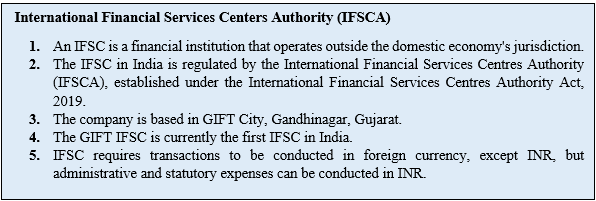- Courses
- GS Full Course 1 Year
- GS Full Course 2 Year
- GS Full Course 3 Year
- GS Full Course Till Selection
- Answer Alpha: Mains 2025 Mentorship
- MEP (Mains Enrichment Programme) Data, Facts
- Essay Target – 150+ Marks
- Online Program
- GS Recorded Course
- Polity
- Geography
- Economy
- Ancient, Medieval and Art & Culture AMAC
- Modern India, Post Independence & World History
- Environment
- Governance
- Science & Technology
- International Relations and Internal Security
- Disaster Management
- Ethics
- NCERT Current Affairs
- Indian Society and Social Issue
- NCERT- Science and Technology
- NCERT - Geography
- NCERT - Ancient History
- NCERT- World History
- NCERT Modern History
- CSAT
- 5 LAYERED ARJUNA Mentorship
- Public Administration Optional
- ABOUT US
- OUR TOPPERS
- TEST SERIES
- FREE STUDY MATERIAL
- VIDEOS
- CONTACT US
Direct Listing on Foreign Exchanges
Direct Listing on Foreign Exchanges
07-11-2023

Why in News?
Recently, The Indian government has allowed certain Indian companies to list directly on foreign stock exchanges to access global capital.
- The Companies (Amendment) Act, 2020, introduced a provision effective from 30th October 2023.
- Domestic public companies can list their securities on foreign stock exchanges, including GIFT International Financial Services Centre, with exemptions from procedural requirements.

What is Direct Listing?
- Direct listing allows a company to list its shares on a foreign stock exchange without issuance new shares or raising capital from investors.
- Direct listing differs from traditional IPOs, where a company sells a portion of its shares to the public and raises funds from investors.
- Direct listing differs from depository receipt (DR) route, where a company issues shares to a custodian bank, which then issues DRs to foreign investors.
- DRs are deeds that are traded on a foreign exchange as negotiable certificates representing the company's underlying shares.
- Direct listing enables companies to attract a wider investor base, boost brand visibility, and enhance corporate governance and compliance standards.
How do Indian Companies Currently List on Foreign Exchanges?
- Indian companies currently list on foreign bourses using depository receipts, such as American Depository Receipts (ADRs) and Global Depository Receipts (GDRs).
- Indian companies list their shares on foreign stock exchanges by entrusting them to an Indian custodian, who then issues depository receipts (DRs) to foreign investors.
- Between 2008 and 2018, 109 companies raised over Rs 51,000 crore through ADRs/GDRs.
- After 2018, Indian companies stopped pursuing overseas listings through this route.

Challenges Involved in Direct Foreign Listing
- Legal Incompatibility: Compliance with the laws and rules of the foreign jurisdiction, which may be different from or more stringent than those in India.
- Inappropriate Evaluations: Direct foreign listings face challenges in valuation due to potential differences in valuations offered by global investors compared to those in India.
- Market Volatility: Foreign exchange market volatility and currency fluctuations can significantly impact the share price and returns of companies.
- The text suggests potential conflicts or disputes with existing shareholders, regulators, or tax authorities in India or abroad.
- Lack of Clarity: Clarity is needed on public company classes, securities listed, foreign jurisdictions, permitted stock exchanges, and procedural compliance exemptions for listed companies.
Benefits of Direct Foreign Listing
- Company can benefit from access to a larger and more liquid market, potentially increasing the demand and valuation of their shares.
- Company's ability to connect with a diverse and sophisticated investor base can significantly improve its reputation and credibility.
- This method can potentially aid startups and unicorns in raising funds and enhancing their global visibility.
- The IPO or DR process can result in significant savings on costs and time, including underwriting, listing, and legal fees.
- The goal is to prevent the loss of ownership and control that comes with issuing new shares or DRs.
- Exposure to foreign jurisdictions' best practices and regulations can enhance their governance and transparency.
Conclusion
The recent decision by govt. will help in expanding India Inc.’s reach in the foreign markets which will boost India’s image as a global economy.



